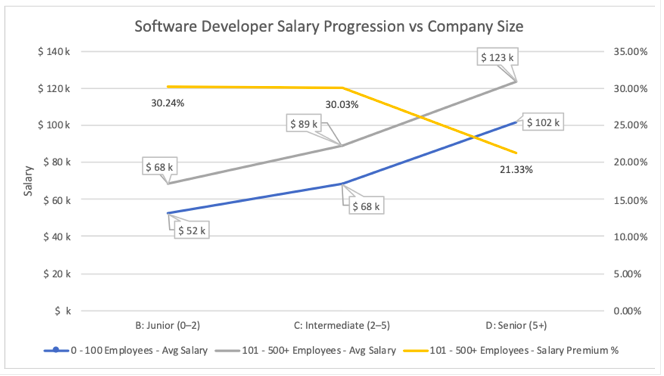YYJ Tech, a grassroots Slack community for Victoria’s tech ecosystem, recently surveyed its members in order to better understand compensation among the different roles of Victoria’s tech workers. The survey saw more than 200 member respondents anonymously submit salary data, along with details about their role and company.
“As more and more large, multinational companies move into our region, we’re going to see the wage disparity grow.”
Ian L. Paterson, a data entrepreneur and CEO of Victoria-based Plurilock, analyzed the results of YYJ Tech’s survey. He expressed to BetaKit that Victoria is not immune to Canada’s nationwide tech talent shortage, which has made competitive compensation packages a hot-button issue. Victoria has a mix of very early-stage, emerging startups, as well as branch offices for large multinationals, and Paterson said this mix makes compensation disparities in Victoria worth analyzing.
“Despite the amount of momentum around the growth of the local ecosystem, Victoria’s tech community remains a bit of a secret,” Paterson told BetaKit. “I think our external image needs to be stronger, like Kelowna’s and Waterloo’s, and that takes leadership from within the industry and in government to promote and support Victoria’s innovative firms.”
Most of the survey’s respondents were software developers working at smaller firms, with 60 percent working at companies of 100 employees or lower. Nearly half (45 percent) were full-stack developers, and 57 percent were senior employees with more than five years of experience.
RELATED: Experience Tectoria wants to show you why Victoria is Canada’s next big startup hub
Paterson said the two biggest variables that impact software developer salaries appeared to be years of experience and size of company, with software developers at companies with more than 100 employees earning about 30 percent more than their counterparts at smaller companies.
According to the survey, an average junior software developer in Victoria makes $52,000 annually, working at a company of fewer than 100 people, and 30 percent more ($68,000) at a large company with more than 100 employees. The average intermediate software developer with between two and five years of experience makes $68,000 working at a small company, and 30 percent more ($89,000) working at a large company. This pay gap narrowed for senior software developers of five or more years of experience; those at small companies made an average of $102,000 while those at large companies make 21 percent more ($123,000).

Victoria does not house any companies with more than 500 workers, but Paterson said it does have a considerably large population of remote workers for larger firms such as Shopify, Amazon, and Workday. He noted this could be an indicator that larger firms employing remote workers in Victoria are driving this wage disparity.
Paterson concluded from the survey that new tech workers entering the workforce will make more if they work at larger companies than they would at smaller ones. To counter this, smaller companies could offer employees additional benefits such as stock options or increased work flexibility, as they may not have as much cash compensation, he noted.
“Success in this area will lead to more jobs, more opportunities, and greater prosperity for the city.”
“This phenomenon is not unique to Victoria. I hear the same challenges from my colleagues in Vancouver and Toronto trying to hire talent only to lose out to larger salaries,” Paterson said. “What I think this disparity leads to is a perception among workers that a role [such as a] DevOps engineer, should be paid ‘X,’ without taking into account the differences in company size, stage, and resources available to them.”
After the release of the survey, two founders published blog posts discussing their views on compensation. Brad Van Vugt, the co-founder of programming competition Battlesnake, gave his reasoning for making non-negotiable job offers at his early-stage startup. Tim Teh, founder and CEO of gaming startup Kano, wrote about how the way his startup’s outlook on compensation has evolved. Paterson said conversations like these are already beginning to drive change locally.
“If we see the momentum in our tech sector slow, and the outputs of domestic firms shrink as large foreign companies become our anchor firms, our community will not get to reap the wealth that successful homegrown innovation firms produce,” Paterson said. “Success in this area will lead to more jobs, more opportunities, and greater prosperity for the city and its inhabitants.”
Read Paterson’s analysis of the YYJ Tech survey results here.
Image courtesy Wikimedia Commons


